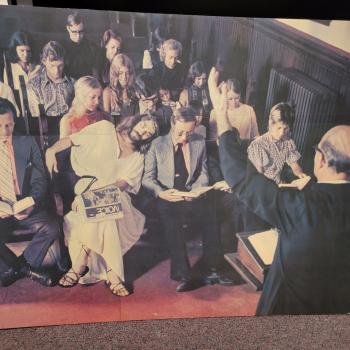One of the tendencies of conservative readers of the Bible is to minimize, ignore, misinterpret or whittle off the bits that are difficult or where there are differences in the accounts. Let’s deal with examples of each mistake, taking the latter example first. As is well known, the four accounts of the three denials of Christ by Peter accompanied by cockcrow or cockcrows differ. All of the accounts agree that Peter did exactly what Jesus predicted he would do, namely deny Christ three times. But Harold Lindsell in his famous or infamous book The Battle for the Bible put on his harmonizing hat and came up with six denials of Christ by Peter, something NO account says. Why? Because the relationship between the cockcrows and the denials vary in the Gospel accounts and he just couldn’t accept that. Was there only one cockcrow after all the denials? Were there several cockcrows during the denials? Inquiring minds want to know.
The problem however is anachronism, taking a modern historical mentality of what an accurate account must look like and then trying to shoehorn the Biblical stories into what to us looks like perfection. This is a mistake. One must first know how ancient historians wrote and whether they were even concerned with the sort of precision we moderns are. After all, ancient people did not wear little sundials on their wrists, and they viewed time in a much more general way. I say– when a Biblical writer wants to give us the gist of what happened and what was said, and not a verbatim, then it should be evaluated as such.
And of course the most telling thing is when, for instance we know the first evangelist took over 95% of Mark’s account with a 50% or more verbatim copying and there are differences still between the Markan and Matthean accounts. This is not an accident or carelessness, this is editorial work on the earlier Gospel. For example, when Jesus is confronted by an inquisitor and is called good teacher, and then asked a question…. Jesus’ response in Mark 10.18 (cf. Luke 18.19) is the abrupt ‘Why do you call me good? No one is good but God alone!’ Clearly, this was too abrupt for the first evangelist and so he turns it into a philosophical question— ‘Why do you ask me about the good? No one is good but God alone’ (Mt. 19.17).
Now this tendency to whittle off the hard edges of Jesus’ sayings doesn’t just happen this one time in Matthew. No, when in Mark Jesus asks his disciples ‘have you no faith?’ what happens in Matthew is we find oligopistoi ‘oh you of little faith’. If this sort of editorial freedom bothers you, you are a good modern person with a modern mentality about history and precision, but you are not thinking like ancient historians who all believed that they had a modicum of freedom to edit and arrange their source material according to their particular purposes.
The Evangelists viewed their Gospel compositions more like portraits, like ancient biographical portraits, not like modern photographs, and they should be judged by the standards of these ancient genre, not by modern ideas of how to do it. So many of the battles of conservative Christians over ‘inerrancy’ are a waste of time because they are not viewing the text like the ancient inspired writers did. What counted as an error to Mark or Luke is one thing, modern definitions of errors vary enormously in these discussions. One person’s ‘clear error’ is another person’s ‘deliberate editorial change to make another valid point with this or that saying or story’. I will mention in passing as well that time actual time references in the Bible don’t conform to our precision pinching mentalities. For example the phrase ‘immediately’ doesn’t really mean immediately in most cases. It just means ‘and then’ or ‘next’. Or to take another example, the phrase ‘on the third day’ can mean exactly the same thing as ‘after three days’ because the latter does not necessarily refer to three whole 24 hour days. I could go on.
Another sort of false harmonizing happens to those stories about Jesus cleansing of the Temple. I like to ask my students, how many times did Jesus cleanse the temple? Some students say one, but others say ‘oh no, he did it twice. Once at the beginning and once at the end of his ministry’. What’s wrong with this picture? All four Gospels have exactly one account of Jesus’ cleansing the temple, and the details of all the accounts are in most respects so similar that most scholars are in agreement– this is a single story. No one would be saying otherwise were it not for the fact that the Fourth Gospel writer has the story near the beginning of his Gospel, whereas the other three Evangelists have it during the last week of Jesus’ life. The false harmonizing modern mentality says ‘well he must have done it twice’. There are several problems with that answer: 1) the Fourth Gospel, while having a general chronological ordering of events is the Gospel that takes the most liberties in schematizing his story and in fact eliminating a lot of what is found in the Synoptic Gospels. There are no exorcisms in John, which early in Mark is the most frequent miracle. Instead there are seven sign narratives, and only one miracle overlap with the Synoptics– the feeding of the 5,000 walking on water tandem of stories is found in all four Gospels. In other words, the 4th Evangelist takes many liberties in arranging, schematizing (seven signs, seven I am sayings etc.) and presenting his material. The placing of the cleansing story up front in his Gospel is because he is establishing a theme— Jesus replaces the institutions of Judaism with himself– he is the Word of God, he is the sacrificial system— both the Lamb of God and the priest and even the temple with his body being called the temple. He is the fulfillment of all the festivals— he’s living water, the bread of life, the Passover lamb and so on. In short, the placement of the cleansing in John is NOT chronological, it’s theological, not a surprise in a Gospel which front lights theology; 2) historically if Jesus had cleansed the temple early in his ministry do you really think the high priest and his entourage would have allowed him back in the temple time and again to teach, as he does? No. absolutely unlikely from a historical point of view.
So….. we do no good service to the inspired Word of God by engaging in exegetical gymnastics and false harmonizing. What we need to do is study and respect the original contexts and genres of that ancient literature and then interpret the text. As I am want to say— a text without a context (in this case its original contexts) is just a pretext for whatever you want it to say.

















